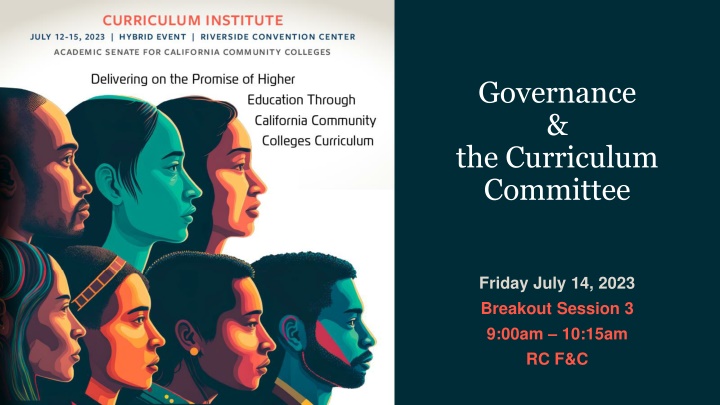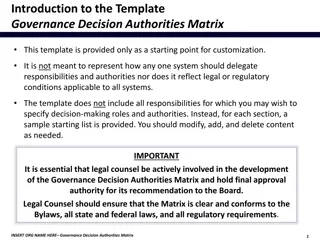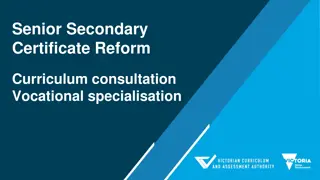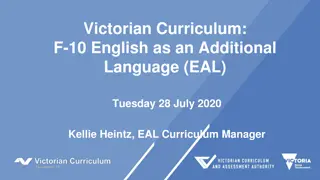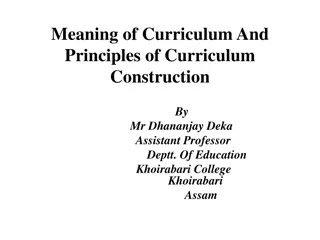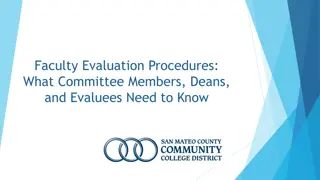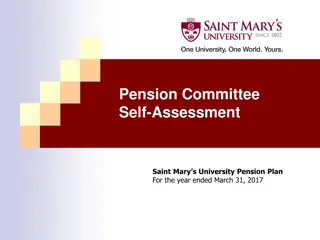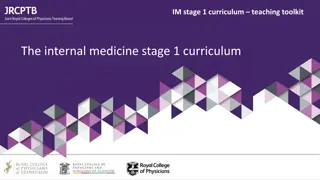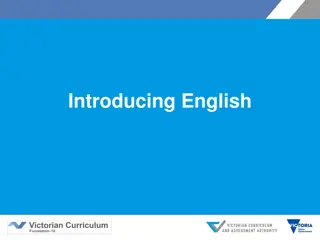Governance & the Curriculum Committee: Understanding Regulations and Structures for Effective Governance
This session explores the regulations and governance structures related to curriculum committees in colleges and districts, emphasizing the partnership between administration and academic senate. Key topics include establishing curriculum committees, examples of committee setups, and discussions on local governance structures and processes. The presentation covers curriculum development criteria, challenges, and the authority of academic senates in curriculum decisions.
Download Presentation

Please find below an Image/Link to download the presentation.
The content on the website is provided AS IS for your information and personal use only. It may not be sold, licensed, or shared on other websites without obtaining consent from the author.If you encounter any issues during the download, it is possible that the publisher has removed the file from their server.
You are allowed to download the files provided on this website for personal or commercial use, subject to the condition that they are used lawfully. All files are the property of their respective owners.
The content on the website is provided AS IS for your information and personal use only. It may not be sold, licensed, or shared on other websites without obtaining consent from the author.
E N D
Presentation Transcript
Governance & the Curriculum Committee Friday July 14, 2023 Breakout Session 3 9:00am 10:15am RC F&C
California Code of Regulations 55002 requires that the college/district curriculum committee be established by mutual agreement between the administration and academic senate. This session will consist of a primer on the requirements for establishing the curriculum committee, some examples of how colleges have set up their curriculum committees, and a lively discussion about curriculum committee governance: local structures, processes, and possibilities. Presentation Description & Overview Regulations: Curriculum and Governance Curriculum Development Criteria Pressures, Tensions, and Challenges that Emerge Structure of your Curriculum Committee Overview 2
Introductions Kelly Fowler, Vice President of Instruction, Mt. San Antonio College Christopher Howerton, ASCCC At-Large Representative Erik Reese, ASCCC Area C Representative 3
What body approves curriculum? 4
California Education Code 70902(b)(7) The governing board of each district shall establish procedures to ensure . . . the right of academic senates to assume primary responsibility for making recommendations in the areas of curriculum and academic standards. Regulations Curriculum & Governance Title 5 53200 lists the following as academic and professional matters often referred to 10+1 : 1) curriculum, including establishing prerequisites and placing courses within disciplines; 2) degree and certificate requirements; 3) grading policies; 4) educational program development; 5) standards or policies regarding student preparation and success; Curriculum Authority Academic Senates 5
Title 5 55002 : The college and/or district curriculum committee recommending the course shall be established by the mutual agreement of the college and/or district administration and the academic senate. The committee shall be either a committee of the academic senate or a committee that includes faculty and is otherwise comprised in a way that is mutually agreeable to the college and/or district administration and the academic senate. Regulations Curriculum & Governance 2 Curriculum Authority Curriculum Committees 6
Curriculum recommended by Curriculum Committees to Governing Boards for approval. CEC 70902 The [local] governing board shall establish policies for, and approve, individual courses that are offered in approved educational programs without referral to the board of governors. etc. Regulations Curriculum & Governance 3 Curriculum Authority- Local Board & Chancellor s Office Rules for local approval, annual certification, and periodic audits. Curriculum approved by the local governing board submitted to the CO for either chaptering or approval, depending on the type of curriculum. 7
Development Criteria: Looking at the Big Picture PCAH 8th ed. (p.24- 26) Five criteria are used by the Chancellor s Office to approve credit programs and noncredit programs and courses that are subject to Chancellor s Office review. They were derived from statute, regulation, intersegmental agreements, guidelines provided by transfer institutions and industry, recommendations of accrediting institutions, and the standards of good practice established in the field of curriculum design. These criteria have been endorsed by the community college system as an integral part of the best practice for curriculum development. 8
Development Criteria Local curriculum approval should assure that each proposal meets five criteria: 1. Appropriateness to Mission 2. Need 3. Curriculum Standards 4. Adequate Resources 5. Compliance These establish the big picture in approval processes. 9
The stated goals and objectives of the proposed program, or the objectives defined in the Course Outline of Record, must be consistent with the mission of the community colleges as established by the Legislature in California Education Code section 66010.4. Five types of curriculum that fall within the mission of the community colleges: Appropriateness to Mission Degree-applicable credit Non-degree-applicable credit Noncredit Contract education Fee-based community service classes State approval is required for credit programs and for noncredit programs and courses. 10
Appropriateness to Mission (cont.) Basic Considerations for Committee Approval Must be directed at the appropriate level for community colleges; that is, it must not be directed at a level beyond the associate degree or the first two years of college. Must address a valid transfer, occupational, basic skills, civic education, or lifelong learning purpose. It must not be primarily avocational or recreational. Should also be congruent with the mission statement and master plan of the college and district. Courses must provide distinct instructional content and specific instructional objectives. Non-instructional activities and services, such as assistive or therapeutic activities, use of college facilities or resources without specific instructional objectives, or assessment testing are not considered to be courses and are not supported by apportionment. 11
Inclusion, diversity, equity, anti-racism, and accessibility (IDEAA) are at the core of the mission of community colleges Comprehensive Mission Statement Ed Code 66010.1- 66010.7 Higher Education Missions Ed Code 66010.4 66010.2 (c): Educational equity not only through a diverse and representative student body and faculty but also through educational environments in which each person, regardless of race, gender, gender identity, gender expression, sexual orientation, age, disability, or economic circumstances, has a reasonable chance to fully develop his or her potential. Example: DEI in Curriculum: Model Principles and Practices IDEAA 12
The proposal must demonstrate a need for a program or course that meets the stated goals and objectives in the region the college proposes to serve with the program. Need can be determined by multiple factors, including: Educational master planning Needs arising from program review Documented labor market demand (Ed Code 78015) Student demand for transfer preparation in a specific major or for general education Student need for college preparation course work leading to collegiate courses. CTE advisory committees and regional consortium Need Furthermore, a proposed new program must not cause harmful competition with an existing program at another college. 13
Need (cont.) Evidence of labor market need may be submitted in the form of: Statistical projections of growth in specific jobs by county (or labor market area) from the Employment Development Department s (EDD) Labor Market Information (LMI) system Recent employer surveys Industry studies Regional economic studies Letters from employers Minutes of industry advisory committee meetings (when offered in conjunction with other evidence) Job advertisements for positions in the individual college s service area Newspaper or magazine articles on industry or employment trends Studies or data from licensing agencies or professional associations 14
Title 5 mandates that all credit and noncredit curriculum must be approved by the college curriculum committee and district governing board (pursuant to chapter 6, subchapter 2, beginning with 55100) as meeting the standards outlined in 55000 et seq. For program approval, documentation required to ensure: Curriculum Standards The program is designed so that successful completion of the program requirements will enable students to fulfill the program goals and objectives. Programs and courses are integrated, with courses designed to effectively meet their objectives and the goals and objectives of the programs for which they are required. Course outlines of record meet all the requirements of title 5, section 55002 for credit and noncredit course requirements. 15
The college must demonstrate that it has the resources to realistically maintain the program or course at the level of quality described in the application. This includes assurance of sufficient funding for: Faculty compensation Adequate Resources Facilities and equipment Library or learning resources and the college must demonstrate that Offering the course(s) at the level of quality described in the Course Outline(s) of Record Further, the college must commit to offering all of the required courses for the program at least once every two years, unless the goals and rationale for the particular program justify a longer time frame as being in the best interests of students. 16
It is also required that the design of the program or the course is not in conflict with any law including state and federal laws, both statues and regulations Some of the title 5 sections to note are: Open course regulations [Cal Code Regs, tit 5, 51006] Course repeatability regulations [Cal. Code Regs., tit. 5, 55040-55046 and 58161] Regulations regarding tutoring and learning assistance [Cal. Code Regs., tit. 5, 58168-58172] Regulations regarding open-entry open exit courses [Cal. Code Regs., tit. 5, 58164] Statutes and regulations on student fees [Cal. Code Regs., tit. 5, 76060.5, 76142, 76223, 76300, 76355, 76360, 76365, 76370, 76395] Prerequisite and enrollment limitation regulations [Cal. Code Regs., tit. 5, 55003] Particular provisions of the Nursing Practice Act [title 16] Compliance 17
About the Development Criteria Local practices vary; not all criteria are evaluated by curriculum committees Some colleges and districts delegate review and endorsement of some criteria to other processes, e.g. departmental or administrative review, CIO review, tech review, etc. It is good practice for the five criteria to be explicitly discussed as part of new curriculum approval process to ensure adequate review and input from faculty and local senates. 18
Pressures, Tensions, and Challenges that Emerge Examples of Possible Pressures: Offer Appropriate Lower Division Coursework Assist and Support Discipline Faculty Interests Uphold CCC curricular standards Community demands Single College vs. Multi College District Challenges Others? Discussion Questions: Ever feel conflicted by a curriculum proposal? Does speaking up put you in conflict with a colleague? Examples? Yikes! AB 928 & AB 1111 Follow up: What strategies help you navigate these turbulent waters? 19
Structure and Placement of Your Curriculum Committee in Governance Discussion Questions: 1. What is the leadership of your curriculum committee? 2. How is your membership organized? Voting members? Resource members? Representation? 3. Is your curriculum committee a sub-committee of your local senate? How does curriculum move from your curriculum committee to your governing board? Does your curriculum committee have sub-committees, for example technical review? 4. What role does your faculty curriculum chair play in your academic senate operations? 5. How is information shared between your curriculum committee and your senate? 6. Process for Senate President review and sign off on local approval and annual certification. 20
As we consider governance with our curriculum work, do not forget the student voice in participatory governance. Student Voice in Curriculum Development Significant effect on students 9+1 (Title 5 51023.7) ..colleges and districts must provide students the opportunity to participate in formulation and development of district and college policies and procedures that have or will have a significant effect on students. 4) curriculum development 21
Review and evaluate the effectiveness of local curriculum processes Ensure that local senate purview over curriculum and the connection between the local senate and the curriculum committee are well-understood Ensure that the curriculum committee structure includes a diverse array of faculty, academic administrators, students, and staff that can provide a variety of expertise and perspectives without weakening faculty primacy over curriculum Ensure that the process for the initiation of new curriculum and revisions to existing curriculum is clear, the technical review process is streamlined and effective, and curriculum committee meetings are run efficiently. ASCCC Paper Recommendations Ensuring Effective Curriculum Approval Processes: A Guide for Local Senates 22
Streamline the curriculum approval process by ensuring a sufficient frequency of curriculum approval opportunities by the curriculum committee and the governing board, establishing an expedited approval process for time- sensitive proposals, and providing individual colleges in multi-college districts autonomy over their curriculum Provide professional development at the appropriate level for faculty, administrators, students, and staff, with more detailed training provided to those most closely involved with the local curriculum process Advocate for sufficient resources to support the work of the college curriculum team, including reassigned time or additional compensation, and for the provision of ongoing funding and access to professional development opportunities Ensure that faculty initiators of distance education proposals are provided with professional development on effective practices for ensuring regular and effective contact and compliance with accessibility requirements. ASCCC Paper Recommendations (Cont.) Ensuring Effective Curriculum Approval Processes: A Guide for Local Senates 23
Some Additional Resources An Effective Curriculum Processes Primer (ASCCC) October 1, 2016 Ensuring Effective Curriculum Approval Processes: A guide for Local Senates (Adopted Spring 2016) Program and Course Approval Handbook (PCAH) 8th Edition - CCCCO 24
Questions? Thank you! info@asccc.org
